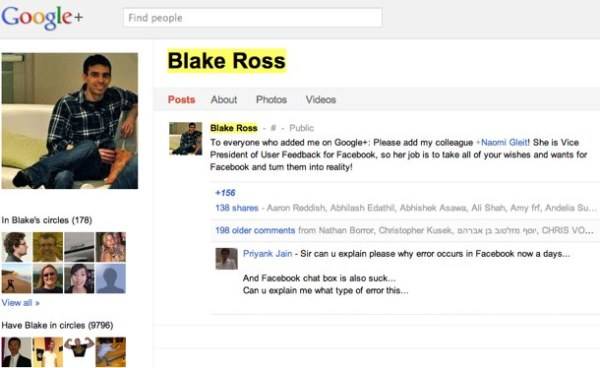There are currently eight people with Google Plus profiles under the name Blake Ross, but the Blake Ross that cofounded Firefox years ago and is now the Director of Product at Facebook is no longer one of them. That Blake Ross has been kicked off of Google’s social network because “After reviewing your profile, we determined that the name you provided violates our Community Standards,” Google said in its standard message Ross said tonight was sent to him. Update: This morning Ross’s profile has been turned back on.

That’s the message that all the people being kicked off of Plus are receiving, but most of them are being removed from the network due to their use of pseudonyms. The ban against pseudonyms is being applied very subjectively as well, but as far as I know, Blake Ross is really Blake Ross. The other 8 Blake Rosses have been allowed to stay so far. This one had 10,000 people following him on Plus when he was kicked off, too. If you weren’t convinced this policy was reckless and excessive before, this certainly calls it all the more into question.

Above, a screenshot of Ross’s Plus profile in Google’s cache, taken Saturday. Today visiting Ross’ profile URL returns a 404 error, “The requested URL was not found on this server. That’s all we know.” I’ve emailed Google’s press hotline to see if that’s really all the company knows. Update: A Google person sent us what appears to be a form email back in response, saying the company cannot comment on particular account suspensions and referred us to this statement on the banning policy by Bradley Horowitz. I’ve pushed back and asked for a specific comment, given that Blake Ross is probably one of the most important people on the entire email.
We’re hearing that this process is almost if not entirely automated and is capturing a whole lot of people clearly by mistake; in many cases banned people are quickly returned to the network.
From the screenshot it looks like poor Ross had to deal with the same semi-coherent ramblings about alleged Facebook bugs and poor design that he no doubt has to deal with on Facebook.com, too. Nonetheless, he seems to find the removal of his Plus profile objectionable. “Google+ banned me for having the audacity to be named Blake Ross?” he Tweeted tonight. “Are they just banning all FB’ers? I smell fear.”
Google’s “real names” policy on Plus has been the subject of intense debate and extensive discussion (both!). History will probably look back at it as something Google mismanaged even more than the presence of business accounts before they were officially supported; some of those were allowed to simply change their account names to the names of their well-known company founders. That was widely derided as unfair of Google and pathetically manipulative of those who took such a step.
See also: No Pseudonyms Allowed: Is Google Plus’s Real Name Policy a Good Idea?
When it comes to names, pen names and anonymity, though, then it’s often a matter of freedom, power and social marginalization. The My Name is Me project (“Supporting your freedom to choose the name you use on social networks and other online services.”) is a notable effort to illuminate the issues at hand.
But come on, the guy who cofounded the second most popular browser on earth? The guy now in charge of product at Facebook? Google has let the Big Z keep his profile on Plus, even though he’s done nothing publicly visible with it yet.
Presumably this is a mistake and the famous Blake Ross will be allowed to return to Google’s social network along with the other eight Blake Rosses there once Google leadership hears about this in the morning. As has already been said many times in regards to this policy, though, if you’re not so well connected – then you probably won’t have as much luck.
Update: After publication, we’re hearing that the bot we might call The Plusblaster is banning people so willy-nilly that many people are being allowed back on when mistakes are made.
None the less, this is not just a technical problem: a policy that prohibits identity obfuscation is likely to have substantially adverse consequences on a societal level.
Facebook, of course, has the same policy requiring that users create accounts under their real names.

















